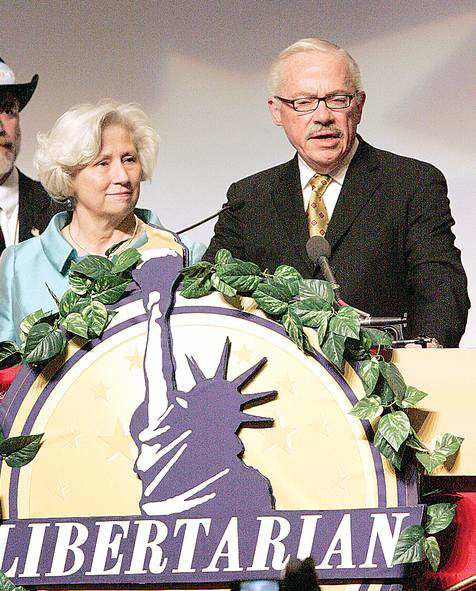GOP defections to Libertarian Party strike fear — among Libertarians
Published 5:00 am Sunday, June 1, 2008

- At its May 25 convention, the Libertarian Party picked former Republican Congressman Bob Barr, of Georgia, to be its presidential candidate. With the nomination — and an influx of new conservatives to the Libertarian ranks — the party is earning the nickname “the New Republican Party.”
DENVER — For years, conservative-minded, home-schooling mom Shana Kluck, of Tuscaloosa, Ala., voted Republican. No longer.
Fed up with what she saw as big government at home and unnecessary military intervention overseas, she worked for Ron Paul in his quest for the Republican presidential nomination. Now that he’s fallen short, she’s switching parties. She hit Denver last weekend to help former Republican Congressman Bob Barr win the Libertarian presidential nomination.
That kind of defection has some Libertarians thinking Barr could turn the fledgling party into a magnet for disaffected conservatives, gain national attention, and, perhaps, even draw votes away from Republican John McCain in close states, as Ralph Nader did to Al Gore in Florida in 2000.
“I traditionally voted Republican. But we wanted a conservative, and we didn’t get that. McCain is not a conservative,” Kluck said. “With Barr as the Libertarian candidate, people will be willing to cross party lines.”
“He’s going to open doors to the Libertarian Party that other candidates can’t open,” agreed Natalie Clackum-Barker, a nurse and longtime Libertarian from Acworth, Ga.
But some Libertarians fear an influx of conservatives and/or Republicans could remake their party. Delegates at the convention found on their chairs an anonymously printed mock news release proclaiming the renaming of the party as “the New Republican Party.”
That could present a challenge for Barr, according to Russ Verney, Barr’s manager and the former manager of Ross Perot’s third-party campaigns in 1992 and 1996.
“The Barr nomination puts the party in a whole new league. Barr would draw more media attention and more votes,” he said.
Party members cheered a keynote speech from longtime conservative strategist Richard Viguerie titled “Conservatives are off the GOP reservation. Will they find a home in the Libertarian Party?”
“Millions of grass-roots conservative activists and donors have left the Republican Party, and taken with them their volunteer time, their checkbooks and their votes,” he said in his speech.
“The Republicans have betrayed us, abandoned the conservative cause,” he said in an interview. While he doesn’t agree with the Libertarians across the board — he wants a federal role in social issues, for example — he does see them as closer to the true conservative cause than the Republicans.
“I’m working seven, eight, nine hours a day to relaunch the conservative movement. I see Libertarians as important to helping bring that along,” he said.
Still, Verney said, some Libertarians don’t want the added attention.
“They want to continue having their debates over esoteric issues,” he said. “They’re for absolutely no taxes, absolutely no government. Bob Barr believes government is too big and wants to lower taxes. But to believe there should be no government is irresponsible.”
Libertarians do resemble conservatives in some regards: pushing for smaller federal government and lower taxes, for example. But they tend to break with the Republican Party on many more, notably opposing U.S. military interventions in Iraq and elsewhere, the suspension of civil liberties in the name of fighting terrorism, and federal regulation of social or moral issues such as abortion and marriage.
Barr, who gained national attention as one of the Republicans who managed the impeachment of President Bill Clinton, left the party two years ago and joined the Libertarian Party. He was the best known of 14 candidates seeking the nomination May 26.
How much Barr could impact the 2008 election depends on several factors, including how many states would put him on the ballot, how many votes he received, and how close the race ends up between McCain and the Democratic nominee, Hillary Clinton or Barack Obama.
An InsiderAdvantage poll in his home state of Georgia — touted by Barr supporters because it showed him with the support of 8 percent — actually showed him with no impact on the outcome as McCain still led by double digits, enough to win the state handily.
Yet one recent Rasmussen poll suggested he could have some effect. The national survey showed Obama with the support of 42 percent, McCain with 38 percent, Barr with 6 percent and Nader with 4 percent. The poll showed Barr taking slightly more from Republicans than Democrats.
“I’m a competitor, and I’m in this to win,” Barr said after the vote on May 26. “I do not view the role of the Libertarian Party to be a spoiler, and I certainly have no intention of being a spoiler.”






